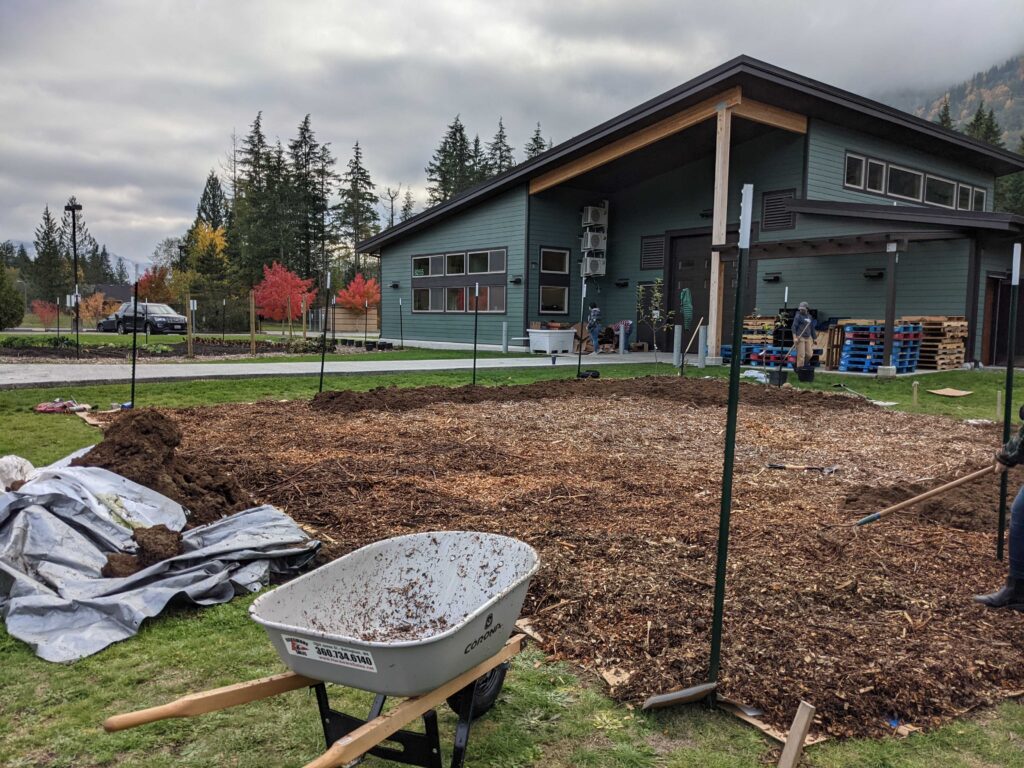written by Corinne Hill-James, Response Corps Member
Common Threads helped install two new educational community gardens at the East Whatcom Regional Resource Center this summer to provide residents of rural Whatcom county with an example and inspiration for growing their own food.
The East Whatcom Regional Resource Center (EWRRC) is a community hub in Maple Falls run by the Opportunity Council that provides services and resources for people in this rural part of the county. The community center houses the Foothills Food Bank, the Mount Baker Head Start preschool program, indoor and outdoor event space, and a wealth of other resources including free wifi and phones, healthcare information, and employment support. When the COVID-19 pandemic hit in Spring of 2020, gardens emerged as a new opportunity for a resource at EWRRC as a site of community resilience and self-sufficiency.
Jessica Bee, coordinator of EWRRC, along with Holly O’Neil, owner of Crossroads Consulting, shared some of the initial ideas for building an educational garden at the resource center at the end of March 2020 as EWRCC and Foothills Food Bank were adapting to the challenges of supporting the community during the pandemic. They saw a demand for more food resiliency in a region disproportionately affected by food insecurity.
According to the 2019 East Whatcom Food Landscape Assessment, East Whatcom County is a rural food desert where many people struggle to access healthy and affordable food, having to drive to Bellingham to shop at a supermarket or buy food from convenience stores where food tends to be limited in selection and more expensive. COVID-19 only added to these challenges. Jessica saw the opportunity to provide an example of what can be grown locally and easily without much space or labor. Her vision is that these gardens serve as “a seed planted in the community that helps other people say, ‘you know what, my backyard could have a garden’”.
With technical advice and support from Common Threads’, the resource center started two new gardens (in addition to an existing community garden space), one for the food bank and one for the Head Start preschool, as well as a small fruit orchard of tree saplings donated by Cloud Mountain Farm. The food bank garden just finished up its first season of production this Fall; a harvest basket sat outside the fence all summer for anyone to take produce like fresh tomatoes and kale to sample as they walked by the garden on their way to the resource center. Veggies, herbs, and berries will be planted this coming Spring in the Head Start garden with the help of preschoolers and their families.
However, the ultimate goal of these gardens extends beyond food, to provide knowledge and empowerment to people in East Whatcom. According to Janette Wade, site coordinator of the Mount Baker Head Start program, the gardens are there “to show children and families that number one, it’s easy to do and we can do it, and to show them what a true farm-to-plate looks like so that it will hopefully empower parents in our programs to create their own garden spaces and start growing their own food.”
Sam Norris, the new executive director of Foothills Food Bank, hopes that the gardens can serve as an educational tool where people can learn how to compost at home, or graft fruit trees, giving them skills to grow food themselves. Common Threads plans to work with the Head Start program to implement garden lessons into their curriculum so that preschoolers can get their hands in the dirt and get involved in growing their own food that will make its way into their snacks and lunches. Janette of the Head Start program sees the garden contributing to a sense of community and ownership where kids, parents, and teachers can gather to sow seeds and harvest together each season.
Jessica describes the new resource as “a garden that grows other gardens.” When people come to access other resources at EWRRC or come to walk their dog or picnic, they can see the gardens and take away inspiration and joy. “It also is a form of abundance action,” she says. “It’s not rooted in a scarcity model–it’s saying here, where you live, where you may feel like you’re struggling to get food, and there’s a hardship around keeping yourself and your household nourished, there’s a possibility to nourish yourself here.”
With these new gardens in East Whatcom County, more people will be able to experience the joy of growing food and have easier access to fresh produce. They offer a roadmap for other families, preschools, and community centers in areas burdened by food insecurity to take it into their own hands to generate an abundance of food and shared knowledge to grow stronger and more resilient.

